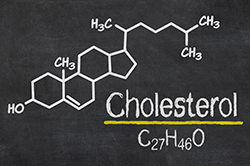CHOLESTEROL- HOW IMPORTANT IS IT AND WHAT DO YOU DO ABOUT IT?
Cholesterol is a risk factor for heart disease and peripheral vascular disease, but not for stroke unless it is extremely high. According to current medical literature, total cholesterol should be less than 200, with LDL or bad cholesterol less than 130. HDL, the protective or good cholesterol, which functions to carry cholesterol away from blood vessels, should be over 50. Another important number is the ratio of total cholesterol to good cholesterol (Chol/HDL), and this number should be less than 4.0.
Additional lab studies permit further differentiation of individual cholesterol patterns. These include apolipoproteins a1 and b, and LDL cholesterol particle number and particle size. Lipoprotein a, oxidized LDL, and LpPLA2 are also indicators of cholesterol risk.
Unfortunately, many physicians are prescribing statin drugs to patients with high cholesterol who have no history of heart disease. In women with no history of heart disease, cholesterol-lowering drugs provide no benefit in preventing heart attacks. In men with no history of heart disease, you have to treat 50 men to prevent one heart attack.
In men and women with a history of heart disease, LDL cholesterol should be brought into the range of 60-70.
The statin drugs are not benign. They frequently cause muscle pain and weakness that can be severe and debilitating. Symptoms may take weeks to resolve after the drug is stopped. Statin drugs may also impair memory, thus raising concern that they may contribute to Alzheimer disease. Statin side effects are related to the drug dose. Lower doses are safer, so nutritional changes and cholesterol-lowering supplements allow for reduction of statin dosage.
High cholesterol does not always mean heart disease is imminent. We have numerous patients in their 70’s and 80’s with high cholesterol and no disease. Some have cholesterol as high as 250-300, with LDL up to 200.
One useful test to assess risk is a coronary artery calcium score. Calcium is deposited within coronary artery walls as part of the disease process. The higher the calcium score, measured by C-T scanning, the greater the risk of cardiac events. If the calcium score is zero, there is virtually no risk, no matter how high cholesterol is. Many older patients with high cholesterol have calcium scores of zero. Statin drugs will not be of benefit.
The best way to lower cholesterol is to change food choices. Eliminate dairy products, especially cheese and ice cream, keep milk to a minimum and use organic or raw milk. Some people believe raw milk is completely safe and will not elevate cholesterol levels. I have seen no studies on this. I once lowered my cholesterol 40 points just by stopping dairy products.
Eat no more than 7 eggs a week. Reduce intake of meats, especially fatty meats like lunch meats and hot dogs. Eat as many fruits and vegetables as you can. They contain no cholesterol.
Supplements to lower cholesterol include niacin, bergamot and plant sterols. Triglycerides, a component of the cholesterol panel and a risk factor for heart disease, can be reduced with niacin and fish oil. Alcohol, sugar, and refined carbohydrates like bread and pizza are major causes of high triglycerides.
You can see changes in cholesterol levels within 1-4 weeks of making dietary and supplement changes. In many people, these nutritional changes and the addition of supplements are more effective in lowering cholesterol than statins, and they offer no risk. When the cholesterol falls low enough, you can reduce or discontinue statin drugs.
– Allan Sosin, M.D.

